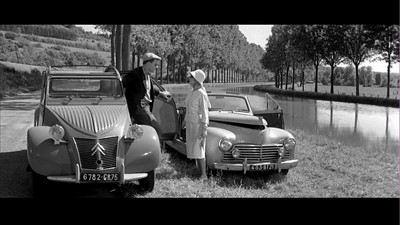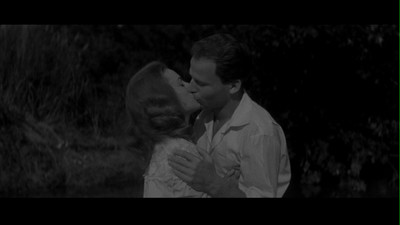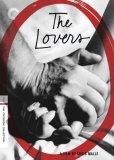| Reviews & Columns |
|
Reviews DVD TV on DVD Blu-ray 4K UHD International DVDs In Theaters Reviews by Studio Video Games Features Collector Series DVDs Easter Egg Database Interviews DVD Talk Radio Feature Articles Columns Anime Talk DVD Savant Horror DVDs The M.O.D. Squad Art House HD Talk Silent DVD
|
DVD Talk Forum |
|
|
| Resources |
|
DVD Price Search Customer Service #'s RCE Info Links |
|
Columns
|
|
|
Lovers - Criterion Collection, The
THE MOVIE:

Louis Malle's 1958 film The Lovers (Les amants) is an erudite reimagining of a traditional bodice ripper. Jeanne Moreau, who had made her name with the young director in Elevator to the Gallows, plays Jeanne Tournier, a bourgeois housewife stuck in a passionless marriage with a rich newspaper editor, Henri (Alain Cuny). Seeking refuge from this dismal union, she regularly travels from their country home to Paris under the cover of visiting her best friend Maggy (Judith Magre), but really to hook up with her lover. Raoul (Jose Luis de Villalonga, the Brazilian moneyman in Breakfast at Tiffany's) is a dashing Spanish polo player, and Jeanne sees him as a rugged and sophisticated man's man, the alternative to her button-down, business-minded husband.
Jeanne's disaffection not only shows on screen, but also surfaces in a third person narration that Malle cunningly chooses Moreau to read. It has a disassociative effect, that the woman is both in the moment and out of it, commenting on her own existence as a pitying other. Perhaps sensing his wife's ennui, as well as maybe picking up signals regarding her true relationship to Raoul, Henri starts insisting that Jeanne spend more time at home. He even cancels his own plans so that he can spend the weekend with his wife, asking her to invite Maggy and Raoul to their home rather than allowing her to spend the time away. She still insists on an overnight trip to Paris, ostensibly to lay the groundwork for this impossible situation, but also presumably as one last hurrah in case it all falls apart.
It's hard to tell what Henri really knows. Once everyone is at the Tournier home, it's fairly obvious to the outside viewer that Jeanne is incapable of hiding her unease of having her lover and her husband in the same place. Henri seems to see it, but he doesn't show it. He pours on the charm, but his motives are unclear. As it turns out, he's watching the wrong man, anyway. Neither he nor Raoul suspects that Bernard (Jean-Marc Bory), the learned drifter that has escorted their woman home, is going to be the downfall of them both. He's a man who, though born into their level of the social hierarchy, has dropped out in favor of what he sees as a more liberated existence, and he has a contempt for the way all of them conduct themselves.

Malle appears to take great delight in playing with the conventions of seedy romantic tales, turning rather conventional situations into visual and literary metaphors. When Bernard first meets Jeanne, she is literally stranded, her car having broken down on the side of the road, next to a river, equidistant between her lover in Paris and her husband at home in Dijon. He rescues her first from that predicament, and then from her stalled sex life. While Raoul and Henri represent society and industry, Bernard is nature and instinct. His ruggedness makes Raoul's safely structured athletic career seem ridiculously wimpy. Jeanne and her people have tried to sequester themselves from the natural world, seeing it as a quaint thing to visit but otherwise as an impediment to their consumption of fashion, gossip, and the other accoutrements of a material life. Bernard's appearance is like an infestation. At dinner, a bat flies in through the window; later, a fly buzzes around Jeanne's head, irritating her, yet pushing her outside, where she meets Bernard for their first, albeit unplanned, rendezvous.
The night forest is photographed in chilly grays, lit to appear almost otherworldly, Jeanne standing out from the background in stark relief thanks to her angelic white nightgown. Bernard is not content to make Henri a mere cuckold, but he mocks the husband, as well. Before he even meets the man, he characterizes him as a bear, but not a force of savagery, one who is more domesticated, like a circus performer. Leading Jeanne through the woods, he happens upon a fish trap that Henri has set in the river, and Bernard sets all his capture free. He then takes Jeanne onto a small boat on the selfsame river--likely also the one she was stranded by only that afternoon--and the two new lovers float adrift on its waves, surrendering to the natural flow. Though earlier in the film Maggy thinks she can see a change in her friend thanks to her love of Raoul, Bernard awakens something more primal in her. When they return to the house, the dogs stir, barking at the newly sensual beasts that approach.
1950s audiences must have been as scandalized as the dogs when they saw the scenes that followed. Bernard ravages Jeanne in her bedroom. She wears nothing but a pearl necklace (yes, I know!), and Malle shows her writhing in ecstasy after Bernard has disappeared off the bottom of the screen. Yet, here amidst the breathless, orgasmic exclamations, Malle is already starting to turn our preconception of romance stories on its ear. Though our inclination is to root for Jeanne's liberation, it's difficult not to question her moral choices. On the way to her bed, the two adulterers pass through her daughter's bedroom, and Jeanne checks on the girl, the tuck-in serving as a good-bye of sorts to her old life. My eyebrow certainly rose when Bernard almost immediately turns the girl's existence into a part of his seduction, declaring that he not only loves Jeanne, but her daughter, as well. Men truly will say anything to get a woman into bed!

That crass come-on resonates well into the next scene, particularly when Jeanne makes silly declarations about the eternal value of their very young love. While we know her quality of life has not been ideal, Malle has had his topsy-turvy way with our perceptions from the moment the drama settled at the Dijon estate. Raoul reveals himself to be a bit of a bore, and Henri is uncharacteristically doting, and though Jeanne and the audience both suspect that it's fueled by his own suspicions, it causes us to doubt if he is as bad as we thought. Then again, maybe it's not uncharacteristic, since a concerned maid has told us that the father spoils his child, so maybe Malle has made us too trusting in Jeanne's interpretation of things. The writer/director has already fooled us in this way once, making us think that Henri was also engaging in infidelity before revealing that his mistress is his work, exactly as he said it was.
Certainly we are ill prepared for Jeanne, a wife and a mother, to abandon it all to run off with this wanderer whom she has just met. Even his decision to carry her away is somewhat ironic, given that when they first met, he refused to hurry her home, claiming he never resorted to speeding in his car because he didn't believe in going too fast. Their flight is meant to be romantic, but something isn't right. Bernard insists she bring no possessions, and though it's meant as a gesture to their new life where they need only each other, given his previous political statements, it comes off more possessive of him. If she has nothing but him, she can rely only on him. Plus, he is making her come to him on his terms, sacrificing all for his sake.
Post-coital guilt rises with the sun. Even as they flee the estate, the bliss of their night of passion starts to go sour. Mirrors reflect their guilt back at them by showing them their own haggard appearances--he is unshaven, her sleepless night has created bags under her eyes that her lack of make-up leaves uncovered. She can barely stand to be looked at. Bernard says that he wishes it could always be night, and almost immediately after, a rooster crows three times. It's a Biblical number, making me think of Peter denying Christ three times before the cock crowed. It's just the quantities here have been swapped.
The final images of the lovers together, along with the last telling lines of narration, are also reminiscent of Mike Nichols' The Graduate. Though all the words spoken and everything we know tell us this must be a happy occasion, love conquers all, the expressions on the faces of the pair doing the loving suggests something else entirely. Real life waits over the horizon. The idyll only existed in darkness.
The Lovers is one of those movies I have been anxiously awaiting on DVD. I first saw it at a retrospective of Louis Malle films a couple of years ago. It was actually the only installment of the series I attended, and more for Jeanne Moreau than Malle. I can't recall whether I had seen this movie before or after I saw Moreau in Tony Richardson's similar 1966 film Mademoiselle, but they still exist as linked for me. Whereas Richardson's story of a repressed schoolteacher teems with sweat, musk, and the earthiness of dew and soil, Malle's picture is perfumed and well bathed. Mademoiselle posits that society's repressive morality has real consequences, and the pent-up sexual energy is released with the forcefulness of natural disasters, but Malle seems to suggest that the problems here are not so much with society as with the individuals. Jeanne is certainly not repressed, as her affair with Raoul is never presented as non-sexual. The problem lies more in the fact that she has created her own illusion about her fancy life, and she fails to see that by accepting Bernard's Kerouac-esque presentation, she is really trading one illusion for another. Both relationships are jails, just with different jailers.
Which isn't mean to suggest that the sexiness of The Lovers is somehow false, because nothing could be further from the truth. It's a story tantalizingly told, panting with the salaciousness of Hollywood "women's pictures" by the likes of John M. Stahl or the female-centric noirs of Otto Preminger. It's just that for as sexy as the movie is, Louis Malle is aware of the consequences of surrendering too much to raw emotion and never stopping to ask yourself what will be waiting behind the lust when it eventually clears.

THE DVD
Video:
The Lovers - Criterion Collection has a virginal black-and-white picture, transferred to disc at a very wide 2.35:1 aspect ratio. It's a near perfect print, with no blemishes or problems with tonal values. The blacks have a nice, deep look to them, and the whites are luminous.
The box boasts that this is the original, uncensored version of the film. I don't know exactly what was censored before, though it was most assuredly in the orgasmic love scene, which includes a very brief glimpse of female nudity. The film infamously was embroiled in an obscenity case in the U.S. when it was shown in Ohio, so I am sure it was trimmed for subsequent theatrical showings to avoid any further litigation, despite the original ruling against the film being overturned by the Supreme Court. In fact, it was The Lovers that apparently inspired the still-in-use loose definition of obscenity: "I know it when I see it."

Sound:
The French soundtrack is preserved in its original mono format, and the audio mix is really sharp, full of natural tones and no extraneous noise. The optional English subtitles are well written and easy to read.
Extras:
The Lovers - Criterion Collection is packaged in a clear plastic case with printing on all sides of the cover. I like that the same image that appears on the disc itself also appears underneath, though the circular red swirl that goes around Jeanne Moreau on the surface of the DVD has a nice vertigo effect, evoking the spiral of passion her character will find herself in. The accompanying 14-page booklet has cast, crew, and chapter listings, along with photographs and a critical history of The Lovers by film professor Ginette Vincendeau.
The main extra on the DVD is a collection of archival interviews featuring the film's participants. There are two both of Malle and Moreau. The director speaks about The Lovers in both 1963 (9 minutes, 45 seconds) and 1994 (19:30), whereas Moreau is interviewed just after the Cannes premiere in 1958 (2:40) and 1972 (6:15), and spends both conversations defending her character and the choices she makes as an actress. A short piece (5:30) from French television with Jose Luis de Villalonga, shot before production began in 1958, reveals that the actor, who was making his debut in The Lovers, had already lead an interesting career as a political journalist, novelist, and playwright. Finally, Louise de Villmorin was a novelist and friend of Jeanne Moreau who wrote dialogue for The Lovers, and the eccentric author was interviewed in 1965 (3:50) about her contribution.
A short gallery shows promotional material from the mid-60s U.S. release that came after the obscenity charges were overturned, and it includes text explaining the controversy.
FINAL THOUGHTS:
The Lovers is one of my favorite Louis Malle movies, and the new Criterion DVD--its first U.S. release in the format--is a beautiful package, from the sophisticated design of the cover to the spotless widescreen video transfer. Jeanne Moreau is amazing as the bored, well-to-do housewife who has her preconceptions of a sensual life completely destroyed by a mysterious stranger who gives her a ride home. On a weekend that should have been a disaster, where her husband and her previous lover were to meet for the first time, she finds a whole new passion. Busting bourgeois illusions while also deconstructing traditional romantic plotting, Louis Malle creates a sexy movie about sexual freedom that self-reflexively comments on the perils of getting what you wish for. It's a dreamy, heady, and, above all, lusty motion picture, and Highly Recommended.

Jamie S. Rich is a novelist and comic book writer. He is best known for his collaborations with Joelle Jones, including the hardboiled crime comic book You Have Killed Me, the challenging romance 12 Reasons Why I Love Her, and the 2007 prose novel Have You Seen the Horizon Lately?, for which Jones did the cover. All three were published by Oni Press. His most recent projects include the futuristic romance A Boy and a Girl with Natalie Nourigat; Archer Coe and the Thousand Natural Shocks, a loopy crime tale drawn by Dan Christensen; and the horror miniseries Madame Frankenstein, a collaboration with Megan Levens. Follow Rich's blog at Confessions123.com.
|
| Popular Reviews |
| Sponsored Links |
|
|
| Sponsored Links |
|
|
| Release List | Reviews | Shop | Newsletter | Forum | DVD Giveaways | Blu-Ray | Advertise |
|
Copyright 2024 DVDTalk.com All Rights Reserved. Legal Info, Privacy Policy, Terms of Use,
Manage Preferences,
Your Privacy Choices | |||||||













